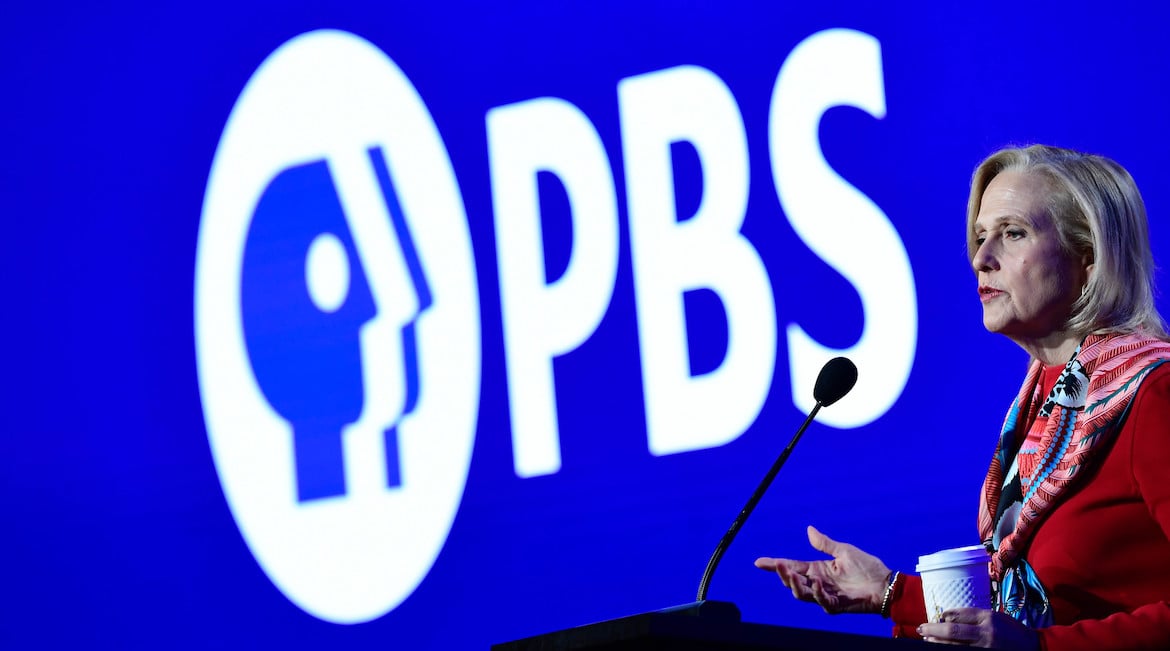PBS, Lakeland PBS sue over Trump’s executive order

Rahoul Ghose / PBS
PBS President Paula Kerger speaks during an executive session at the Television Critics Association Press Tour in January 2020.
PBS and Minnesota’s Lakeland PBS are suing to halt President Trump’s executive order aiming to prevent federal funding from going to PBS and NPR.
The lawsuit, filed Friday in the U.S. District Court for the District of Columbia, follows a separate lawsuit from NPR and three Colorado public radio stations that was filed Tuesday.
“After careful deliberation, PBS reached the conclusion that it was necessary to take legal action to safeguard public television’s editorial independence, and to protect the autonomy of PBS member stations,” a PBS spokesperson said in an emailed statement.
PBS and Lakeland PBS are suing Trump and other federal agencies and officials, arguing the executive order goes against the Public Broadcasting Act and the First Amendment.
“The [executive order] makes no attempt to hide the fact that it is cutting off the flow of funds to PBS because of the content of PBS programming and out of a desire to alter the content of speech,” PBS’ lawsuit said. “That is blatant viewpoint discrimination and an infringement of PBS and PBS Member Stations’ private editorial discretion.”
The May 1 executive order, titled “Ending Taxpayer Subsidization of Biased Media,” instructed executive agencies and CPB’s board to stop federal funding for NPR and PBS. It also called for CPB to stop “indirect funding” by ensuring that public stations and others that receive CPB funds do not use federal dollars to pay NPR and PBS.
“At the very least, Americans have the right to expect that if their tax dollars fund public broadcasting at all, they fund only fair, accurate, unbiased, and nonpartisan news coverage,” the order said. “No media outlet has a constitutional right to taxpayer subsidies, and the Government is entitled to determine which categories of activities to subsidize.”
Lakeland PBS will be “severely impacted” by the order keeping federal money from going to PBS indirectly, Friday’s lawsuit said. PBS content makes up the vast majority of the Bemidji, Minn., station’s programming.
Lakeland PBS’ $2.7 million annual budget includes about $1 million from federal grants awarded by CPB, and the station pays its annual PBS dues using Community Service Grant funds, according to the lawsuit.
“Lakeland PBS cannot readily or affordably replace such content and services,” the lawsuit said. “The EO’s indirect funding bar thus poses an existential threat to Lakeland PBS, the only local source of television programming for hundreds of thousands of Minnesotans.”
Meanwhile, PBS has a $373.4 million budget for 2025, with 61% coming from member station dues, 16% from CPB grants and 6% from other federal grants, the lawsuit said.
Federal funding from CPB makes up more than half of some PBS member stations’ budgets, the lawsuit said.
“Accordingly, the EO jeopardizes a considerable portion of PBS’s 2025 budget: the 22% that comes directly from CPB and certain federal agencies, and the 61% that comes from PBS Member Station dues, which includes millions of dollars in federal funds,” the lawsuit said.
In an emailed response to NPR’s lawsuit earlier this week, White House Principal Deputy Press Secretary Harrison Fields said CPB is “creating media to support a particular political party on the taxpayers’ dime. Therefore, the President is exercising his lawful authority to limit funding to NPR and PBS. The President was elected with a mandate to ensure efficient use of taxpayer dollars, and he will continue to use his lawful authority to achieve that objective.”





